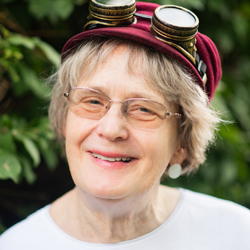
Why do many white people from outlying areas of my city avoid driving in predominantly African-American sections? Answer: They tell each other that the city people are murderous thugs, out to prey on strangers. It’s very dangerous. Never mind that the statistics don’t bear them out.
What did Hitler tell the Germans about the Jews that led the Germans to turn their heads when their Jewish neighbors were marched away to their doom? Answer: Hitler told them the Jews were manipulative, dangerous, and powerful. Never mind that the opposite was true.
Racism comes from fear, and from unfamiliarity. People become convinced that those in another group are not to be trusted and might do terrible things if you let them.
Racism is based on the innate fear of strangers that we all have. Once someone is branded a stranger, we decide they might very well hurt us, and we don’t care about defending their rights. It’s us vs. them. War. They seem less than human to us. Demonized. Other. Not in my tribe.
We’re all fearful of strangers. Including me.
So, how do I combat racism in myself? A good start would be to make a decision to adopt the other-person into my tribe, in my own mind. A decision to look this person in the eye and deal normally with them. A decision to reach out.
Mostly those who experience racism are in minority groups. So those of us in the majority have a lot of trouble believing it’s a problem. We’ve hardly experienced the short end of the stick. So we declare everything’s okay.
But ignoring the situation doesn’t mean it goes away.
In my city, St. Louis, we have unofficial dividing lines for neighborhoods. On the north side of the central east-west avenue, Delmar Boulevard, are mostly black folks. On the south side, mostly white. Sure, we’re all free to move around these days, in a way that wasn’t possible in the 1950s and before.
Nobody is chaining us to the places we live—unless we are too poor to afford to move. And with that poverty comes poor schools, without the taxpayer support that the outlying areas enjoy. And without a good education, no way out for those who want out.
This is not a post-racial America.
To make a difference, each of us needs to make a habit of reaching out beyond our comfort zone. How will you do that today?









Growing up I lived on the North side. I was young so I didn’t pay attention to the divide. When I returned to St. Louis after a few years in the Navy. I really saw how segregated we were and still are after being home 20+ years.
I moved to South St. Louis, because I like the diversity and I still like it. My neighbors are all nationalities. We say hi to each others but we aren’t friends, like how I grew up where you knew everyone on your block. Now you way hello and go inside your home.
The children play together but as they become teenagers they start hanging with their own.
We have to break the cycle of hanging with our own.